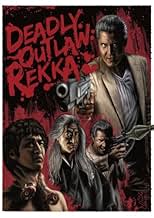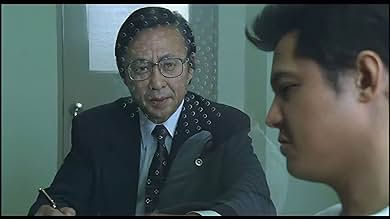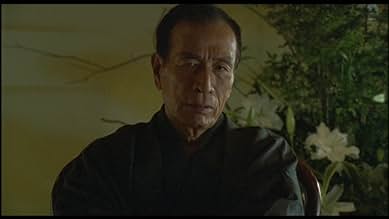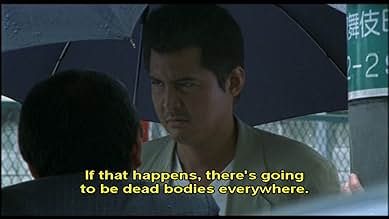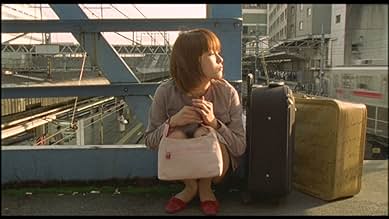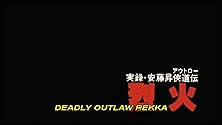IMDb RATING
6.7/10
1.8K
YOUR RATING
When his beloved boss is killed, a dangerous young gangster cuts a path of vengeance through the Japanese mafia.When his beloved boss is killed, a dangerous young gangster cuts a path of vengeance through the Japanese mafia.When his beloved boss is killed, a dangerous young gangster cuts a path of vengeance through the Japanese mafia.
- Director
- Writer
- All cast & crew
- Production, box office & more at IMDbPro
Featured reviews
DEADLY OUTLAW: REKKA is a rare misfire from the usually interesting Takashi Miike, who can typically be relied upon from making outrageously entertaining movies. This is a standard Yakuza movie, featuring a low rent thug who decides to go on an odyssey of revenge, yet despite a few moments of surrealism and violence you can't really tell it's a Miike film at all.
Instead it has more in common with low budget art-house fare, featuring interchangeable characters and some padded scenes of characters wandering the streets aimlessly at night. Oh, there's bound to be a brutal fight scene or execution around the next corner, but there isn't anything that makes you care about what's going on. Okay, I don't watch a Miike film for the characterisation, but at least ICHI THE KILLER had tons of incident and AUDITION's slow build worked when matched with THAT ending.
This one's predictable in the extreme, I couldn't care less about the characters, and the whole 'stone face' type of acting is just a bit dull. Miike tries to spice things up with a sex scene here and a mutilation there, but it isn't enough; for much of the running time, I was simply bored. DEADLY OUTLAW: REKKA does have the same kind of hustle and vibe as the early gangster films of Beat Takeshi, but it lacks their finesse and raw power. Attempts to make it feel like an old-fashioned grindhouse movie of the 1970s don't really gel either; instead this movie is both slight and forgettable.
Instead it has more in common with low budget art-house fare, featuring interchangeable characters and some padded scenes of characters wandering the streets aimlessly at night. Oh, there's bound to be a brutal fight scene or execution around the next corner, but there isn't anything that makes you care about what's going on. Okay, I don't watch a Miike film for the characterisation, but at least ICHI THE KILLER had tons of incident and AUDITION's slow build worked when matched with THAT ending.
This one's predictable in the extreme, I couldn't care less about the characters, and the whole 'stone face' type of acting is just a bit dull. Miike tries to spice things up with a sex scene here and a mutilation there, but it isn't enough; for much of the running time, I was simply bored. DEADLY OUTLAW: REKKA does have the same kind of hustle and vibe as the early gangster films of Beat Takeshi, but it lacks their finesse and raw power. Attempts to make it feel like an old-fashioned grindhouse movie of the 1970s don't really gel either; instead this movie is both slight and forgettable.
Seemingly modeled after DEAD OR ALIVE, starting off with a stylistical hodge podge of slow-mo gunfights and paranoid posturing and sizzling in the finale with a fair share of comic-book outrageousness, Rekka succeeds as a movie not for being ultraviolent or particularly graphic (it is neither by Miike standards - although still violent enough to raise a public outcry if it was the work of a mainstream American director), not because yakuza underlings get shot full of holes or Riki Takeuchi scowls like a bulldog as he shoots rocket launchers in the middle of crowded streets (DOA homage anyone?), not for the sound and fury, but for the moments in between. In that respect, Rekka is antithetical to DOA. Whereas DOA dragged through a drab and lifeless middle act to arrive at an exciting conclusion, Rekka sustains itself through moments of quietude and intimacy. In between the outbursts of violence, Miike gives us life as lived. Takeuchi's friend giving him advice on his hair dye. The glances between Takeuchi and his Korean girlfriend. The dingy eateries, night clubs and neon-lit streets - Miike prowling Fukasaku's stampin' grounds half a century after the patriarch of the yakuza film first pictured a different kind of postwar Japan.
In the end, Rekka works so well as a movie because Miike restrains the child within him eager to shock and impress and embraces the dramatist who observes the small moments of life. The plot is mostly forgettable, something about the son of a yakuza boss going on a spree to avenge the death of his father while a gangland conspiracy festers behind and a war between the different fractions is about to break out, and Takeuchi in the leading role scowls a little too much for my liking. But overall, this is as good a yakuza flick as I've seen from Miike, violent, funny, occasionally beautiful, imaginatively conceived but hastily executed (as with most Miike films), a thoroughbred Miike flick bearing all his trademarks, one aimed at both the heart and the gut. Not a masterpiece of any kind but a worthwhile movie.
In the end, Rekka works so well as a movie because Miike restrains the child within him eager to shock and impress and embraces the dramatist who observes the small moments of life. The plot is mostly forgettable, something about the son of a yakuza boss going on a spree to avenge the death of his father while a gangland conspiracy festers behind and a war between the different fractions is about to break out, and Takeuchi in the leading role scowls a little too much for my liking. But overall, this is as good a yakuza flick as I've seen from Miike, violent, funny, occasionally beautiful, imaginatively conceived but hastily executed (as with most Miike films), a thoroughbred Miike flick bearing all his trademarks, one aimed at both the heart and the gut. Not a masterpiece of any kind but a worthwhile movie.
Miike shows us in this film his outstanding gift for the yakuza genre from the first minute to the last. This time he adds a soundtrack from the Flower Traveling Band, Satori, a Doom Metal key album from 1971 that makes those master shoots, of perfect color, shine without stopping during the cinematographic experience he proposes.
His characters flow before the viewer like a handful of impossible to stop Japanese scarfaces. Shinjuku, mafia, escorts, magic and Rock and Roll !!
This was really one great ride from Takashi Miike, if you love or you are familliar with his style you will really enjoy Deadly Outlaw:Rekka, it is not intelligent movie, it is not movie with a big budget but it is entertraining and full of energy, and yes the cast in this one is amazing, so many great memorable faces from Japanese cinema, sadly a lot of them are now deceased: Joe Yamanaka, Rikiya Yasuoka, Yuya Uchida, Tetsuro Tanba, Shin'ichi Chiba and the main protagonist of the movie Riki Takeuchi, this is one of his most memorable roles for sure. The first half of the movie is like any other regular Yakuza movie, the second part is more unique cartoonish Miike style, and it works in the movie very well, love the ending when Riki is taking Bazooka to destroy his enemies. You will remember this movie thanks to magnificent cast and its charachters, i enjoyed this one more than more known Dead or Alive. In the same day i have watched Kikoku or Yakuza Demon from 2003, it is different sort of the movie, more regular Yakuza crime, but my recoomendation is to watch it in combination with Deadly Outlaw Rekka. I give this one 8/10.
Miike makes another yakuza picture. It's not especially groundbreaking, and it's certainly not one of Miike's deeper films, but it is extremely entertaining. That's mostly because of the main character, Kunisada (Miike regular Riki Takeuchi), who is the most psychopathic character in Japanese movies since Tatsuya Nakadai's evil samurai in Sword of Doom. Kunisada's mob boss, his surrogate father, is ambushed and murdered (though not before nearly strangling his assailant to death; the hit-man only lives because he cuts the dead man's hands off as they clench around his windpipe). Simultaneously, Kunisada, almost as if through a psychic bond, breaks out of jail and starts to go against the rival gang. The only problem is that the boss's death isn't necessarily a bad thing from his own gang's perspective. They and their rival gang try desperately to make a truce. Unfortunately for everyone, except for a small handful of loyal comrades, Kunisada won't stop until everyone around him is dead. The film suffers from Miike's major flaw as a filmmaker: a lack of coherency. There seem to be dozens of named characters, and it becomes very difficult to sort out who everyone is. I had to watch key scenes a second time to piece it all together (though I had most of it straight by the end of the film). But, even if you never quite figure it out, Miike's patented break-neck action sequences are so outrageously done that the film is more than worth watching. Watch out when Kunisada finds a rocket launcher!
Did you know
- TriviaTakashi Miike cut this movie to the strains of the 1971 progressive rock album "Satori" by the Flower Traveling Band, which he learned of through costars Joe Yamanaka and Yûya Uchida, who were also the band's founding members. Miike found the album to be way ahead of its time and was delighted at how well and inconspicuously it cut into a movie made 30 years later.
- GoofsAt 35:52 the shadow of someone holding a hand-held camera can be seen.
- ConnectionsReferenced in Rewind This! (2013)
Details
- Release date
- Country of origin
- Official site
- Language
- Also known as
- Violent Fire
- Production company
- See more company credits at IMDbPro
- Runtime1 hour 36 minutes
- Color
Contribute to this page
Suggest an edit or add missing content

